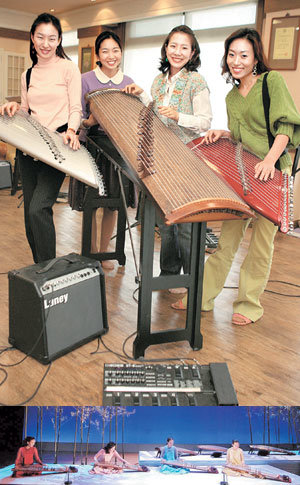Electric Gayageum Is Like a Guitar, Only Korean
Electric Gayageum Is Like a Guitar, Only Korean
Posted November. 30, 2005 07:19,

The crucial phrase of Korean classical music in 2000s is fusion chamber music. Among the leaders of new experiments and creation that grows Korean classical music into a world music are percussion ensembles Puri and Gongmyeong, a new age music group TheLim (Geurim), a world music group Vinalog, and the gayageum ensembles Sagye, Yeoul and AURA.
Yeoul, a gayageum quartet which will hold a concert at 8:00 p.m. on December 13 at Ewha Womans University, performs electric musical instruments for Korean classical music, which is a rarity. Just like modernized Western classical musical instruments, such as the electric violin and electric piano, the ensemble introduces the electric gayageum. In particular, Yeoulgeum, a variation from the 18-string gayageum, can be played like an instrument of a club band, heralding a drastic transformation of the gayageum.
The Hidden Card: the Electric Gayageum-
Founded in 2003, Yeoul was formed by four skilled players who attended Gukak National Middle and High School, and the Department of Korean Music at Ewha Womans University: Ki Sook-hee (27), Lee Su-eun (26), Ahn Na-rae (25) and Park Min-jung (25).
This interview was done on November 28 in a practice room of the research center for Korean classical music and instruments in Hanam, Gyeonggi province. The quartet has been staying together for a month to practice. The electric gayageum that it will introduce in the December concert is its hidden card that has been prepared through the past year.
Ki Sook-hee, the leader of the quartet, said, The gayageum was originally a musical instrument used in a chamber for a small audience. Ki explained the reason why the members developed the electric gayageum, saying, We had to use microphones in performances because the volume of the gayageum was too small to play before a large audience or perform a crossover. We were always unhappy about that.
They developed two kinds of electric gayageum: a 18-string gayageum (Yeoulgeum) that can be hung on the shoulder, and a 25-string that is played on a support.
The electric gayageum, which the members developed by breaking apart dozens of gayageum, boasts varied range and tone. Depending on the adjustment of the effecter, it generates sounds an octave lower or retains a long trailing note like the electric guitar. But it retains the uniquely clear sound of the gayageum because it is also played by finger.
While the violin and guitar sustain the same tone when a player uses vibrato, gayageum generates a different sound because strings waver in a wide range. For this reason, people can feel Korean sentiment by listening to the sound of a gayageum, even when the player performs Western classical music or pop songs, said Ahn Na-rae.
We Could Bite the String of the Gayageum-
The concept for the December concert is band music. I think it is time for Korean classical music to go to clubs in which young people gather, said Park Min-jung.
In the concert, Yeoul is planning to play all their repertories, except one meditation, with the electric gayageum.
The quartet will play classical and modern music from both East and West with the gayageum. Among the repertories for the concert are New Yeongsan Hoesang (composed by Kim Dae-sung), Led Zepplins Stairway to Heaven, a blues number Stray Cat, a samba jazz number Puppy Love, and a Christmas Carol arranged by Hwang Byung-ki.
Hwang, a gayageum maestro, named the quartet Yeoul, wishing it would create a ripple of change in the Korean classical music community. Hwang, who played the gayageum with a bow and released the unconventional album Migung in 1970s, has become a great supporter of the quartets new attempts. He arranged the Christmas carol suite for its concert.
Yeoul always lay the gayageum on a support and play it standing. That is because your hands are freer and you can demonstrate a more active expression in a standing position. Will they bite the strings of the 18-string gayageum hung on their shoulders, if they are excited while playing rock music? Lee Su-eun said, We could, if we get the feel. It depends on the atmosphere of the audience. Concert ticket price ranges from 10,000 to 50,000 won. For more information, call 02-543-1601.
Seung-Hoon Cheon raphy@donga.com







